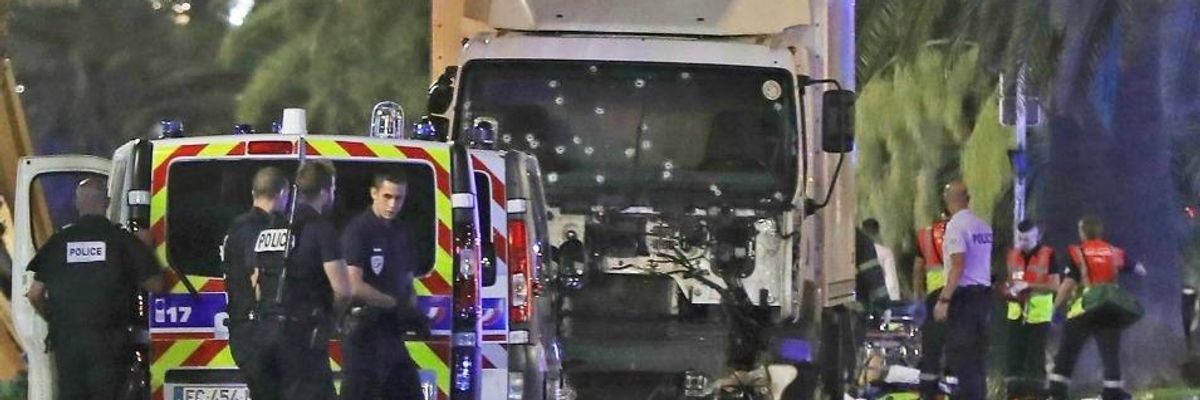Scores of people were killed in Nice, France late Thursday night when a truck rammed into a crowd that had gathered for Bastille Day, in what officials say was a deliberate attack.
At least 84 have been killed, another 50 seriously injured, and many others hurt.
The Guardian is providing live updates here.
The truck slammed into the crowd shortly after a fireworks display celebrating the French national holiday ended around 11pm in the southern coastal city, reportedly swerving and zigzagging for two kilometers (1.24 miles) in an apparent attempt to hit more people.
According to the local paper Nice Matin, the driver also fired on the crowd while ramming through it. He was eventually shot dead by police, who searched the truck and found it was loaded with ammunition and grenades.
The attack has not been claimed by any group or organization.
Reutersreports on the driver's identity:
An attacker who drove a heavy truck into crowds in the French city of Nice killing at least 84 people came from the Tunisian town of Msaken which he last visited four years ago, Tunisian security sources said on Friday.
The man, identified by French police sources as 31-year-old Mohamed Lahouaiej Bouhlel, was not known by the Tunisian authorities to hold radical or Islamist views, the sources said.
Bouhlel was married with three children, they said. The sources did not say when he had last been resident in Tunisia.
It is the latest in a string of attacks to hit France in recent months. Around the world, people gathered to express their sympathy and solidarity, holding vigils and placing flowers in front of their French embassies. U.S. President Barack Obama said he condemned the attack "in the strongest terms."
French President Francois Hollande declared three national days of mourning and extended the country's state of emergency--still in place since November's attack on the headquarters of satirical French magazine Charlie Hebdo--by another three months. He also said France was "tightening up its borders" and that military officials would deploy another 10,000 army reservists to patrol the streets of France, while "activities will be strengthened" in Iraq and Syria.
The controversial state of emergency allows police to conduct unwarranted house raids and empowers officials to place individuals under house arrest.
That response received some guarded criticism from journalists and security experts who pointed to the futility of the so-called "War on Terror."
As Zoe Chapman noted atJust Security on Friday:
The lorry attack comes just as the French government was preparing to relax the state of emergency. If it transpires it was a terror attack, it would represent a breakdown of the "vast security dragnet" France erected following November's Islamic State-sponsored mass killings.
And Simon Jenkins wrote for the Guardian:
Such responses may comfort the citizens of Nice in their state of shock. But there is no defense force on Earth that can defend a crowd from a madman in a truck.
[....] Hollande might more usefully have called up 10,000 psychologists or 10,000 Islamic historians. As for strengthening France's role in the Islamist civil wars in Iraq and Syria, it is hard to imagine anything more likely to incite other young men to suicide attacks.
The Guardian's Paris correspondent Angelique Chrisafis adds that the attack "constitutes a crisis for Hollande's premiership."
"What has happened in France is tragic and calls for human sympathy," Jenkins concluded. "Beyond that, there is nothing we can usefully do--other than make matters worse."

